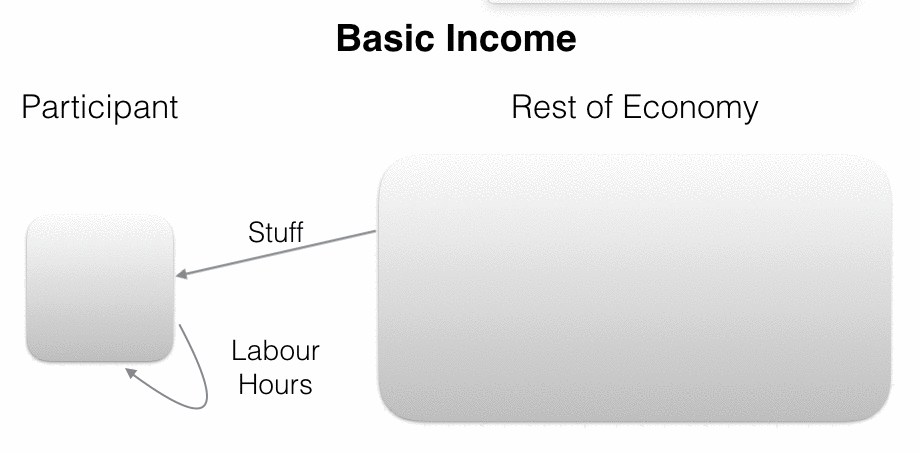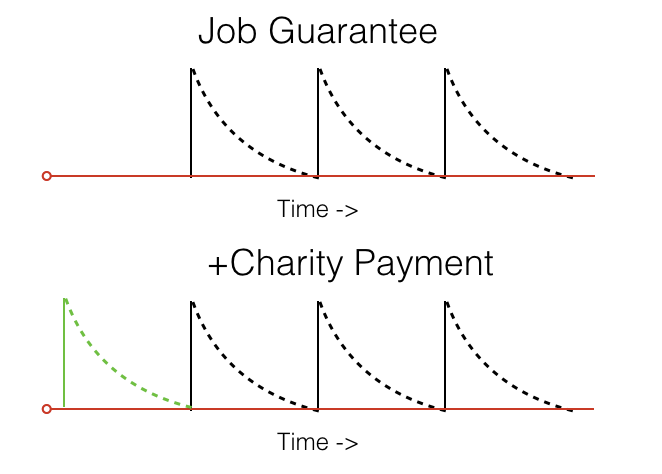The Basic Income idea has some great marketing behind it and superficially appears to solve problems. Unfortunately the tricks used to promote it come straight out of the propaganda textbooks — attributing miracles to the policy when they are not justified.
The main trick is to compare an income guarantee to the broken system we have at the moment. The result is a miraculous increase in output. But that has nothing to do with the merits of Basic Income. It is just what would happen with any system of increased spending activity that knocks our monetary production systems out of the persistent slumps they always find themselves in under ‘laissez faire’ conditions.
It’s only when you compare Basic Income with other managed economy schemes that the issues with it come to light.

The graphic represents a basic income scheme that is monetarily equivalent to a Job Guarantee. In UK terms that is a payment of £375 per week representing a £10 per hour living wage along the lines calculated by the Living Wage Foundation
The rest of the economy will respond to the monetary stimulus and increase its output to its structural maximum, which for the purposes of this article we will assume is identical for both schemes. Whatever distributional outcome is required can be created in the Rest of the Economy via redistributive taxation, and the amount of stuff (goods and services) delivered to Participants is the same.
The difference is that the basic income scheme represents an extraction of goods and services from the Rest of the Economy, whereas the Job Guarantee represents an exchange of 37.5 Labour Hours per week for goods and services from the Rest of the Economy.
In other words the Basic Income participant gets paid twice in real terms . Once in terms of output from some part of the labour hours of the Rest of the Economy and once from their own 37.5 labour hours per week — which are self consumed.
Basic Income injects money into the Rest of the Economy, but without any increase in output available to others. So the total amount of money in the Rest of the Economy naturally chases fewer goods and services. If you are in the Rest of the Economy, you will end up getting less for your money. And we usually call that inflation, but perhaps it is really just a form of theft.
But, But, But
The argument then continues. Of course people are not going to self consume all their hours, but are going to go out into the world and do ‘good works’. But this is a fallacy of composition. There is no more likelihood of enough volunteer opportunities springing up than there are job openings — both due to the matching problem. Instead of hearing those in charge berating people to ‘start their own business’, we will hear them imploring people to ‘start their own charity’.
Since there is no active mechanism to create things to do that are of service to others, the amount available will converge at the usual suboptimal point and a section of the population will be left high and dry — regardless of their intent. Laissez faire works no better with activity than it does with money.
The Job Guarantee solves this by creating things to do. It takes activity to the people where they are and creates roles for the people as they are. If there is to be enough useful service available for everybody, it has to be produced with a managed process.
Exploiting others
The essential weakness of the Basic Income system is known, but hidden in platitudes. Many an article on basic income will highlight the ‘experiments’ that allegedly show wondrous benefits to the participating area.
But they avoid mentioning the hidden issues with these ‘experiments’.
The first is that they are local schemes within a fixed exchange area, and are therefore linked to production areas that have no income guarantee scheme. So the shortfall in output is actually provided by an external group locked into a fixed exchange rate and with no income guarantee. The income guarantee area exports inflation to the non-guaranteed area and steals output to replace its own shortfall, much as the Germans are able to export their unemployment to the rest of the Eurozone and make it look like there is some saving miracle going on in Germany and laziness everywhere else. Look at the overall currency area and the results are less miraculous.
You find this in every experiment. There is either an external group that transfers goods and services into the income guarantee area under a fixed exchange rate system and thereby suffers a real loss themselves, or there is a sub group within the area that is not eligible for the payment and acts as a servant class. It is no co-incidence that those who believe in Basic Income are also advocates for Open Borders and Fixed Exchange rate systems. Those are required to keep the process going.
The second issue is that all the experimental income schemes end, or wither away to an amount that is insufficient to provide an existence. The schemes end because the politics changes and ends them. This is an obvious outcome once the theft of output comes to light. People vote to stop the theft. You will rarely if ever see any discussion of why schemes are ended or run down.
Once a scheme is reduced below the amount of the living wage, it becomes a form of tax credits and those are systemically a subsidy to private businesses. Tax credits induce ‘bullshit’ activities in the private sector — using labour when automation or elimination would be the better options. Only when the public sector provides enough activity for all at the living wage is the private sector required to compete for labour at all levels. Only then is the race to the bottom in wages ended. And all that requires a Job Guarantee — the active process of creating enough to do.
Tying the income to the work prevents the private sector ursuping the scheme and changing it into a subsidy structure for their own benefit.
The fundamental weakness at the core of Basic Income — a focus on rights without an equivalent focus on duties — sows the seeds for its own destruction. The number of failed income guarantee experiments ought to be the first sign of problems, as should the constant run down in unemployment benefit, the end of universality of Family Allowance and the aversion to generous state pensions.
The failure of the UK student maintenance grant scheme is an excellent example of why income schemes are doomed from the start. Introduced in the mid 1960s, it was chipped away and ended by the turn of the millennium. Although the majority of grant supported students were very hard working, a small minority skipped lectures, avoided the library and took up resident in the ubiquitous Mandela Bars of the era. The media took these self-important individuals — full of talk about their rights, but little about their balancing duties to others — created a stereotype out of them and those opposed to grant funding were then able to find their mark. The death of the scheme was then inevitable.
Any reintroducing of student support should come in the form of a job — more akin to an apprenticeship than anything else. You turn up, you do the lectures, tutorials and reading you are required to do, somebody signs off your timesheet and you get paid the living wage for doing the job of educating yourself. Just in the same way as a day release apprentice. That would maintain support in a nation, because you have done something demonstrably of value before you receive anything from anybody else. You have put others in your debt.
Using what for money?
You often read about how basic income will free people to take up education opportunities, learn new skills or pursue other activities.
It’s an astonishing claim. The basic income is basic. It covers just enough to live — in many proposals not even that. What are these people going to use for money to buy all these marvellous services?
The living wage covers transport costs, but a Job Guarantee position provides the on-the-job training. On-the-job training contributes to upgrading skills that are particularly important for specific jobs or specific work environments, emphasizing a learning-by-doing approach.
Leisure is work you pay to do. Work is leisure you get paid to do.
Creating the Basic Income under a Job Guarantee
Basic Income attempts to pay people under what should probably be called the L’oreal Principle (“because you’re worth it”). They want to be paid first and then perhaps do something later if they feel like it. That is a complete reversal of the principle of contribution. Everywhere else you have to be of service to others and put them in your debt first, before you receive anything of real value in return.
Yet there is no need to overturn the entire structure of the current economy. If those people who really believe in the L’oreal Principle want to put it in place under a Job Guarantee system then they can do so. Just endow a charity to give money to people. If the recipients then decide to work for others (perhaps working for the charity) they will receive the Job Guarantee wage which will then, in effect, end up being the advance payment for the following period rather than an arrears payment for the previous one. Like this:

So there only needs to be one initial payment per person from the charity, which can easily be funded by believers in the principle — and tax deductible too. Any costs of excess extraction or free riding are then borne by those who believe in the concept rather than being imposed upon society in general. Those who desire to get paid twice are supported by those who believe they should have that right — in financial and real terms.
All we need are jobs
All the arguments for a basic income scheme are better supported by a Job Guarantee.
- You get a genuine living wage of £375 per week rather than the patently inadequate £71 per week proposed under income schemes.
- There is less tax required overall and less economic disruption because the wage structure is largely retained.
- There are useful activities created locally and tailored to individuals of all abilities so that everybody in society can be of service to others.
- Automation and investment is encouraged in the private sector and the parasite economy terminated. Anybody displaced still has something to do of use to others (or we can lower the state retirement age and retire people earlier).
- Only the Job Guarantee ensures that the level of available activity is adequate for all that want it.
- Being in education is a job. Caring is a job. Childcare is a job.
- Starting a business is a job.
- On-the-job training and learning-by-doing are the best ways to upgrade skills, and the best way to provide this training is via a living wage job.
- Those that wish to see income guarantees in place can easily create that under a Job Guarantee system with a top-up charity funded by their own tax deductible contributions. Fair exchange is no robbery.